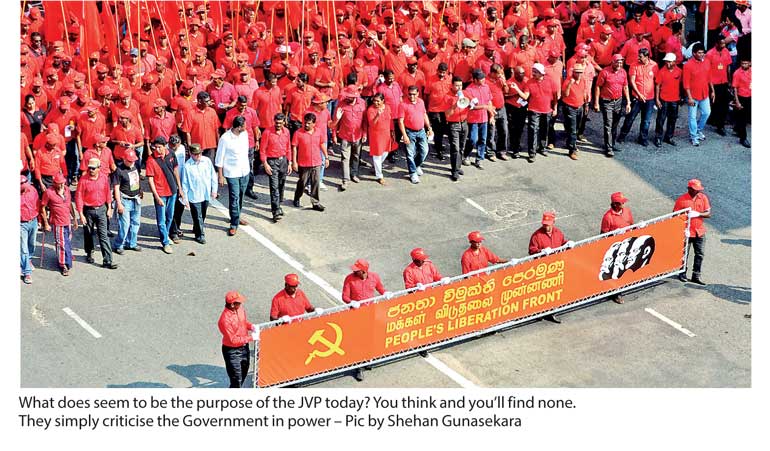Tuesday Feb 24, 2026
Tuesday Feb 24, 2026
Friday, 30 March 2018 00:10 - - {{hitsCtrl.values.hits}}

 Right now, the JVP is set to back the Opposition move for a vote of No-Confidence on the Prime Minister. Has any member of that party reflected on the meaning of such a judgment in terms of the end-goal or purpose of the party?
Right now, the JVP is set to back the Opposition move for a vote of No-Confidence on the Prime Minister. Has any member of that party reflected on the meaning of such a judgment in terms of the end-goal or purpose of the party?
In the original days of the Janatha Vimukthi Peramuna (JVP), it had a clear sense of purpose. Whether that purpose or general goal had been right or apt or realistic is another issue altogether. The important thing is that the party had a clear and unambiguous eventual goal to which it had been working under the leadership of Rohana Wijeweera, Gamanayake, etc. Ask the JVP today what its political purpose is and you will not get a valid answer. The crisis of the JVP today is that it has lost a purpose.
The JVP’s consistently poor showing at elections is largely an outcome of the fundamental reality that the party has ceased to be driven by anything other than being a critic of the government in power – whichever that may be. This is not a goal in any sense of a definition; it is just a state of negative becoming.
Contrast
By contrast, go back again to the 1969-70s. At that time, the JVP took the shape of a growing political force – burgeoning by the day and attracting hundreds of youth from the towns and villages. These youth discovered in the party and its messiah a deeply-enthusing idealism to embrace. JVP had been many things even then; but it carried the idealism of rectifying injustices from society and ushering in social justice for the poor and the disadvantaged of society by the destruction of the ‘evil that is capitalism’. The idea became viral and thousands of youth were able to conceal their prolonged training in the jungles.
When the uprising of April ’71 took place, it came as a shock to the broad masses of rulers and people. Rulers and others were thrown into confusion. Purpose can invest those in possession of it with dynamism and energy; with resilience
Doric’s classes
In my youthful days, the Samasamajists had such an appeal – although by then the appeal had weakened somewhat in intensity.
As a young undergraduate in Peradeniya, I remember how much we were magnetised by the theoretics of Doric De Souza, the exponent of Trotskyism. Doric, reflecting a strange coincidence with the JVP that was to come much later, conducted five classes which he held behind the Hindagala Hotel at the foot of Mahakande. Some of us were individually and collectively caught up and fired by pledging to fight for the eradication of poverty and all social ills which, Doric told us, had been due to the dominance of the capitalist class. We were made to feel heroic as revolutionaries.
A purpose drove us. The very idea of going out of ourselves to fight for a rule of the proletariat gave us adrenalin rushes. Some of us even neglected the reason for which our parents had spent for us to be in the university (at the time, the university wasn’t free). The wider and overriding goal of changing society drove fire within us.
One of our crowd, I remember, dear old “Shan,” wrote slogans on walls with the blood of his veins! In this way, the seniors who were indoctrinated (that is the right word) found it their purpose in turn to indoctrinate freshers who flowed in.
Personally, being a natural sceptic, I did entertain reservations even in those days. Subsequently and out of the university, my exposure to real life confirmed my previous suspicions. The confirmation hardened when, much later, I went to Melbourne University to take an MBA. My exposure to the disciplines of economics and business and to the economic development in Australia made be dump Doric for good.
I learnt how the later capitalism in fact had historically led to huge advances in wealth creation among the poor and working classes of the world. Small wonder that the movement for socialist revolution eventually lost steam and blew out. The idea of a revolution was confined to discourse in parlours and to the small gatherings of intellects.
Marxism in the JVP
On the other hand, the JVP still does officially hold on to Marxism and the guys are red-shirted. However, they haven’t declared any goal of socialism in their published and articulated programs. Have you heard any of them arguing for socialism as we heard the old Left shout hoarse during their golden days? That left has been liquidated and we now find only defunct ghosts like Vasudeva and D.E.W. Gunasekera who talk of everything save of socialism. Besides, they have nothing to show in terms of performance during their jurisdiction in the Rajapaksa Government.
JVP efforts harvested by others
What does seem to be the purpose of the JVP today? You think and you’ll find none. They simply criticise the Government in power. They attacked the Rajapaksas while the latter had been in power. The result was that their efforts translated into votes for the new Yahapalanaya Government. This is the precise impact of mere negative approaches to politics. The criticism of the government in power only helps the opposition. The party does the dirty work of others.
Did you observe how the JVP took on the recent Local Government elections? ‘Give us the villages’ (‘Apata gama deela balanna’) was the JVP slogan. Scathing assaults were directed on the Yahapalanaya Government; but the votes they may have elicited got lodged with the Pohottuwa.
I must say, Anura Kumar Dissanayake does his homework very well and he knows to find faults and to communicate effectively the deficiency of the ruling powers. He is a good politician with a lot of potential. But, then, who benefits – other than those waiting outside to come to Government? The Local Government elections signified a wash-out for the JVP and a swelling of Pohottuwa ranks.
No-Confidence motion impact on JVP fortunes
Right now, the JVP is set to back the Opposition move for a vote of No-Confidence on the Prime Minister. Has any member of that party reflected on the meaning of such a decision in terms of the end-goal or purpose of the party?
The Pohottuwa Opposition is clear about its goal and target, which is to cause instability and bring down the Government. The fall of Ranil means the collapse of the Yahapalanaya Government; thus making way for the return of the Rajapaksa cabal and the closure of all court action. If one looks at the different ‘misbehaviours’ cited in the motion not one can be causatively linked to Ranil as an individual. Thus Ranil isn’t the target; the fall of the Government is.
The JVP should ask themselves the question: how would such a result serve any overall purpose of their party beneficially? The evident outcome would be adverse for the JVP since the Rajapaksas winning would decimate their party further. The track record of the Rajapaksa Government provides enough evidence to surmise that a fresh return of that regime would mean the complete destruction of democracy and a further erosion of human rights.
A returned Rajapaksa regime would get about closing avenues for democratic dissent and conducting elections where the decision is pre-set. The hit squad will return and metamorphose Sri Lanka into another North Korea headed by a “dear leader!” This isn’t wild speculation if one were to assess the conduct and performance of the family regime’s last ruling exercise.
No strategy
A party’s strategy derives from purpose. Not having a purpose has also meant that the JVP doesn’t have a strategy. The party thinks for the day and acts on short term expectations. Not having a purpose means other things. It will denude the energy and drive of the party. The JVP will not be able to attract new members to the ranks.
At this rate, the party’s final end would be to slip into the cosy laps of the Right – just as Vasu or DEW have done. That, too, if the new regime of the Rajapaksas will incorporate the JVP into some concocted fake of a “joint” government.